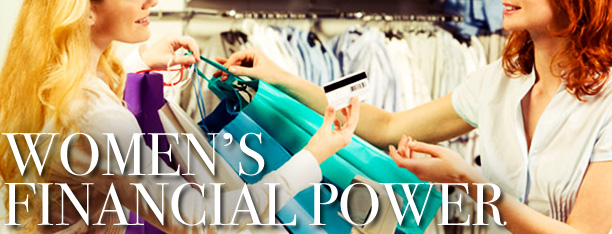
With increasing spending power for women comes an opportunity to influence many aspects of our lifestyle and the world around us.
Are we really satisfied with being offered baubles and trinkets, prettified laptops, sparkly gadgets, expensive dresses, shoes that cripple us, cosmetics full of toxic substances, plastic surgery? To be sold the idea that this is what, as women, we desire from life?
We are under increasing pressure to spend our income, to go into debt even, on ‘improving’ our appearance. This not only undermines us, it creates an unhealthy non-sustainable lifestyle. Being obsessed with physical appearance creates frustration, encourages objectification and takes our focus and money away from much more important issues that we could help to transform.
Even before the financial crisis, the spending power of women was increasing in both rich and poor countries. The downturn has accelerated the trend, particularly in the United States. American men lost more jobs (they worked in the hardest-hit areas like financial services and manufacturing), whereas women started more companies. The pay gap has also continued to decrease. In 35 percent of double-income households in the United States, wives now make more than their husbands, up from 28 percent five years ago. Assuming the trend continues, the average woman will make more than the average man by 2024.
Source: Newsweek The Richer Sex
The potential for positive change through consumer power and conscious choice is enormous. Ethical fashion is one area that we can support and encourage. Is liberation really about being able to buy throwaway seasonal wardrobes enabling the continued exploitation of women in another part of the world?
The US investment bank Goldman Sachs highlighted the rising spending power of women in the world’s fastest-growing economies…
Whereas men use up more of their income on their own consumption — alcohol, cigarettes and high-status consumer goods — women are more likely to buy products and services for their families, including food, healthcare, education, clothing and personal-care items.
Source: Times Online
The pay gap exists but is closing… more women have financial independence and a disposable income, although for most of us it is about being smart with a limited budget, still those items listed above make up a large percentage of our monthly expenditure. In many households the woman holds the purse and makes the spending decisions. If you are a mother at home with children, even if on a tight family budget, you can make choices that influence the market, are healthier for your children and support local economy every time you go shopping.
Making aware, informed, consumer choices in healthcare, non-toxic toiletries and cosmetics, cleaning products and safe materials in our homes is beneficial to our families, community and our planet.
The majority of advertising campaigns targeting women’s money use sexual objectification, sexist obnoxious attitudes, even abusive images suggesting gang rape (i.e. Calvin Klein, Dolce & Gabbana, Diesel…)
Now the negative effects on adolescents and children of sexualised ad campaigns are being discussed and understood, is it really relevant or acceptable to continue to use such images when touting for our dollars?
Using education, campaigns to raise awareness and call for regulation, lobbying politicians, continued research and activism we can bring about change and one of the most effective methods is how we spend our MONEY.
By voting for change with our consumer choices we can impact and influence the image-makers, clothing manufacturers, cosmetic producers and toy makers. This is, after all, the ‘language’ they understand: money talks. Boycott brands, companies and stores that continue with negative advertising, whether it is sexploitation, body hatred or racial stereotypes, don’t fund abusive images with your money and avoid buying toxic products or those produced using ‘sweatshops’… there are alternatives available.
Empowerment comes not only from owning our power, but employing it with wisdom. Are we victims of the media, cash-cows to be pushed around from pillar to post and told how we should look, feel, spend and behave as women? Or can we take the power and be the change?
Then of course the next step is to look more deeply at whether or not we need to consume so much at all!
![]()
http://www.bbc.co.uk/programmes/b011c220#p00h5b4d
BBC Radio 4 Womans hour yesterday held an interesting discussion on ethical fashion…!